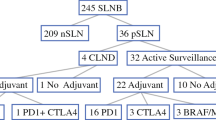Abstract
Introduction
For patients with stage III melanoma with occult lymph node metastasis, the use of adjuvant therapy is increasing, and completion lymph node dissection (CLND) is decreasing. We sought to evaluate the use of modern adjuvant therapy and outcomes for patients with stage III melanoma who did not undergo CLND.
Methods
Patients with a positive SLNB from 2015 to 2020 who did not undergo CLND were evaluated retrospectively. Nodal recurrence, recurrence-free survival (RFS), distant metastasis-free survival (DMFS), and melanoma-specific survival were evaluated.
Results
Among 90 patients, 56 (62%) received adjuvant therapy and 34 (38%) underwent observation alone. Patients who received adjuvant therapy were younger (mean age: 53 vs. 65, p < 0.001) and had higher overall stage (Stage IIIb/c 75% vs. 54%, p = 0.041). Disease recurred in 12 of 34 patients (35%) in the observation group and 11 of 56 patients (20%) in the adjuvant therapy group. The most common first site of recurrence was distant recurrence alone (5/34 patients) in the observation group and nodal recurrence alone (8/90 patients) in the adjuvant therapy group. Despite more adverse nodal features in the adjuvant therapy group, 24-month nodal recurrence rate and RFS were not significantly different between the adjuvant and observation cohorts (nodal recurrence rate: 26% vs. 20%, p = 0.68; RFS: 75% vs. 61%, p = 0.39). Among patients with stage IIIb/c disease, adjuvant therapy was associated with a significantly improved 24-month DMFS (86% vs. 59%, p = 0.04).
Conclusions
In this early report, modern adjuvant therapy in patients who forego CLND is associated with longer DMFS among patients with stage IIIb/c disease.


Similar content being viewed by others
References
Morton DL, Thompson JF, Cochran AJ, Mozzillo N, Nieweg OE, Roses DF, et al. Final trial report of sentinel-node biopsy versus nodal observation in melanoma. N Engl J Med. 2014;370(7):599–609.
Leiter U, Stadler R, Mauch C, Hohenberger W, Brockmeyer N, Berking C, et al. Complete lymph node dissection versus no dissection in patients with sentinel lymph node biopsy positive melanoma (DeCOG-SLT): a multicentre, randomised, phase 3 trial. Lancet Oncol. 2016;17(6):757–67.
Faries MB, Thompson JF, Cochran AJ, Andtbacka RH, Mozzillo N, Zager JS, et al. Completion dissection or observation for sentinel-node metastasis in melanoma. N Engl J Med. 2017;376(23):2211–22.
Herb JN, Dunham LN, Ollila DW, Stitzenberg KB, Meyers MO. Use of completion lymph node dissection for sentinel lymph node-positive melanoma. J Am Coll Surg. 2020;230(4):515–24.
Eggermont AM, Chiarion-Sileni V, Grob JJ, Dummer R, Wolchok JD, Schmidt H, et al. Adjuvant ipilimumab versus placebo after complete resection of high-risk stage III melanoma (EORTC 18071): a randomised, double-blind, phase 3 trial. Lancet Oncol. 2015;16(5):522–30.
Long GV, Hauschild A, Santinami M, Atkinson V, Mandalà M, Chiarion-Sileni V, et al. Adjuvant dabrafenib plus trametinib in stage III BRAF-mutated melanoma. N Engl J Med. 2017;377(19):1813–23.
Eggermont AMM, Blank CU, Mandala M, Long GV, Atkinson V, Dalle S, et al. Adjuvant pembrolizumab versus placebo in resected stage III melanoma. N Engl J Med. 2018;378(19):1789–801.
Weber J, Mandala M, Del Vecchio M, Gogas HJ, Arance AM, Cowey CL, et al. Adjuvant nivolumab versus ipilimumab in resected stage III or IV melanoma. N Engl J Med. 2017;377(19):1824–35.
Chapman BC, Gleisner A, Kwak JJ, Hosokawa P, Paniccia A, Merkow JS, et al. SPECT/CT improves detection of metastatic sentinel lymph nodes in Patients with head and neck melanoma. Ann Surg Oncol. 2016;23(8):2652–7.
Coit DG, Thompson JA, Albertini MR, Barker C, Carson WE, Contreras C, et al. Cutaneous melanoma, version 2.2019. NCCN Clin Pract Guidel Oncol. 2019;17(4):367.
Nijhuis AAG, Spillane AJ, Stretch JR, Saw RPM, Menzies AM, Uren RF, et al. Current management of patients with melanoma who are found to be sentinel node-positive. ANZ J Surg. 2020;90(4):491–6.
Broman KK, Hughes T, Dossett L, Sun J, Kirichenko D, Carr MJ, et al. Active surveillance of patients who have sentinel node positive melanoma: an international, multi-institution evaluation of adoption and early outcomes after the multicenter selective lymphadenectomy Trial II (MSLT-2). Cancer. 2021;127(13):2251–61.
Broman KK, Hughes TM, Dossett LA, Sun J, Carr MJ, Kirichenko DA, et al. Surveillance of sentinel node-positive melanoma patients with reasons for exclusion from MSLT-II: multi-institutional propensity score matched analysis. J Am Coll Surg. 2021;232(4):424–31.
Farrow NE, Raman V, Williams TP, Nguyen KY, Tyler DS, Beasley GM. Adjuvant Therapy is effective for melanoma patients with a positive sentinel lymph node biopsy who forego completion lymphadenectomy. Ann Surg Oncol. 2020;27(13):5121–5.
Mitra D, Ologun G, Keung EZ, Goepfert RP, Amaria RN, Ross MI, et al. Nodal recurrence is a primary driver of early relapse for patients with sentinel lymph node-positive melanoma in the modern therapeutic Era. Ann Surg Oncol. 2021;28:3480–9.
van Akkooi ACJ, Nowecki ZI, Voit C, Schäfer-Hesterberg G, Michej W, de Wilt JHW, et al. Sentinel node tumor burden according to the Rotterdam criteria is the most important prognostic factor for survival in melanoma patients: a multicenter study in 388 patients with positive sentinel nodes. Ann Surg. 2008;248(6):949–55.
Keung EZ, Gershenwald JE. The eighth edition American Joint Committee on Cancer (AJCC) melanoma staging system: implications for melanoma treatment and care. Expert Rev Anticancer Ther. 2018;18(8):775–84.
Author information
Authors and Affiliations
Corresponding author
Ethics declarations
Disclosures
The authors declare no conflicts of interest.
Additional information
Publisher's Note
Springer Nature remains neutral with regard to jurisdictional claims in published maps and institutional affiliations.
Rights and permissions
About this article
Cite this article
Torphy, R.J., Friedman, C., Ho, F. et al. Adjuvant Therapy for Stage III Melanoma Without Immediate Completion Lymph Node Dissection. Ann Surg Oncol 29, 806–815 (2022). https://doi.org/10.1245/s10434-021-10775-8
Received:
Accepted:
Published:
Issue Date:
DOI: https://doi.org/10.1245/s10434-021-10775-8




